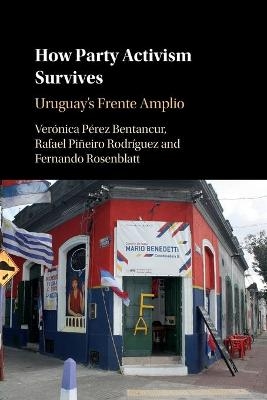
How Party Activism Survives
Cambridge University Press (Verlag)
978-1-108-71937-7 (ISBN)
Political parties with activists are in decline due to various external shocks. Societal changes, like the emergence of new technologies of communication have diminished the role and number of activists, while party elites increasingly can make do without grassroots activists. However, recent scholarship concerning different democracies has shown how activism still matters for representation. This book contributes to this literature by analyzing the unique case of the Uruguayan Frente Amplio (FA), the only mass-organic, institutionalized leftist party in Latin America. Using thick description, systematic process tracing, and survey research, this case study highlights the value of an organization-centered approach for understanding parties' role in democracy. Within the FA, organizational rules grant activists a significant voice, which imbues activists' participation with a strong sense of efficacy. This book is an excellent resource for scholars and students of Latin America and comparative politics who are interested in political parties and the challenges confronting new democracies.
Verónica Pérez Bentancur holds a Ph.D. from the Universidad Torcuato Di Tella, Argentina and is Assistant Professor of Political Science at Universidad de la República del Uruguay. Her research focuses on Latin American politics and gender and politics. Her work has been published in Comparative Political Studies, Revista de Ciencia Política, Revista Uruguaya de Ciencia Política, and Revista Debates. Rafael Piñeiro Rodríguez is an Associate Professor at the Departamento de Ciencias Sociales y Políticas, Universidad Católica del Uruguay. He has published in multiple journals including Comparative Political Studies, Party Politics, Government Information Quarterly, Latin American Politics and Society, Latin American Research Review, Journal of Democracy, Política y Gobierno and Revista de Ciencia Política. Fernando Rosenblatt is an Associate Professor at the Escuela de Ciencia Política, Universidad Diego Portales, Chile as well as a researcher in the Millenium Institute for Foundational Research on Data. His research interests include comparative politics, Latin America, and party organizations. He has published in multiple journals including Comparative Political Studies, Party Politics, Democratization, Latin American Politics and Society, Latin American Research Review, Política y Gobierno and Revista de Ciencia Política. He is the author of Party Vibrancy and Democracy in Latin America (2018).
1. Introduction; 2. Context matters: the political and socioeconomic setting; 3. Voluntary activism in the FA; 4. Origins and reproduction of the mass organic structure; 5. Party structure, efficacy and activism; 6. The limits to strategic adaptation; 7. The FA in comparative perspective; 8. Theoretical conclusions and political implications; Appendiices; Bibliography; Index.
| Erscheinungsdatum | 20.12.2021 |
|---|---|
| Zusatzinfo | Worked examples or Exercises; 21 Tables, black and white; 11 Line drawings, black and white |
| Verlagsort | Cambridge |
| Sprache | englisch |
| Maße | 153 x 230 mm |
| Gewicht | 343 g |
| Themenwelt | Sozialwissenschaften ► Politik / Verwaltung ► Politische Systeme |
| Sozialwissenschaften ► Politik / Verwaltung ► Politische Theorie | |
| Sozialwissenschaften ► Politik / Verwaltung ► Vergleichende Politikwissenschaften | |
| ISBN-10 | 1-108-71937-6 / 1108719376 |
| ISBN-13 | 978-1-108-71937-7 / 9781108719377 |
| Zustand | Neuware |
| Haben Sie eine Frage zum Produkt? |
aus dem Bereich


